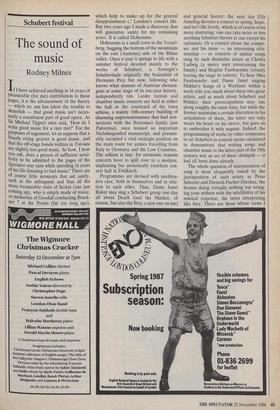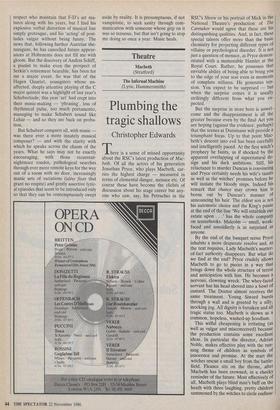Schubert festival
The sound o music
Rodney Milnes
If I have achieved anything in 16 years of pleasurable (for me) contribution to these Pages, it is the advancement of the theory — which no one has taken the trouble to demolish — that good music isn't neces- sarily a constituent part of good opera. As Sir Michael Tippett once said, 'How do I write good music for a race riot?' For the Purposes of argument, let us suppose that a Haydn string quartet is good music, and that the off-stage banda waltzes in Traviata are slightly less good music. So how, I hear you ask, does a person of sufficient sensi- tivity to be admitted to the pages of the Spectator stay sane while spending 16 years of his life listening to bad music? There are of course little moments that aid sanity, such as the infrequent and thus all the more treasurable visits of Serkin (one just coming up), who is simply made of music, or memories of Goodall conducting Bruck- ner 7 at the Proms (far too long ago), which help to make up for the general disappointment London's concert life. But two years ago I made a discovery that will guarantee sanity for my remaining years. It is called Hohenems.
Hohenems is a small town in the Vorarl- berg, hugging the bottom of the mountains on the east (Austrian) side of the Rhine valley. Once a year it springs to life with a summer festival devoted mainly to the works of Schubert, a fortnight's Schubertiade originally the brainchild of Hermann Prey but now, following who knows what manner of Austrian shenani- gans at some stage of its ten-year history, independently run. Lieder recitals and chamber music concerts are held in either the hall or the courtyard of the town schloss, a mainly 16th-century building of charming unpretentiousness that had con- nections with the Borromeo family (see Palestrina), once housed an important Niebelungenlied manuscript, and presum- ably occupied a vital strategic position on the main route for armies travelling from Italy to Germany and the Low Countries. The schloss is tiny: for economic reasons Concerts have to spill over to a modern, unpleasing but acoustically excellent con- cert hall in Feldkirch.
Programmes are devised with unobtru- sive care, both in themselves and in rela- tion to each other. Thus, Dame Janet Baker may sing a Schubert group one day all about Death (and the Maiden, of course, but also the Boy, a new one on me) and general horror; the next day Elly Ameling devotes a concert to spring, hope, and isn't life lovely, which is of course even more shattering: one can take more or less anything Schubert throws at one except his optimism. Or a concert about the compo- ser and his muse — an interesting rela- tionship — or concerts of similar songs sung by such dissimilar artists as Christa Ludwig (a merry aunt entertaining the family) and Brigitte Fassbaender (crossly tearing the stage to tatters). To hear Miss Fassbaender and Dame Janet singing Mahler's Songs of a Wayfarer within a week tells you much about these two great artists, and as much about Schubert and Mahler; their preoccupations may run along roughly the same lines, but while the former maintains a certain discretion in his articulation of them, the latter not only wears his heart on his sleeve, but goes on to embroider it with sequins. Indeed, the programming of works by other composers to set Schubert in context seems calculated to demonstrate that writing songs and chamber music in the latter part of the 19th century was an act of sheer chutzpah — it had all been done already.
The whole question of interpretation of song is most eloquently raised by the juxtaposition of such artists as Peter Schreier and Dietrich Fischer-Dieskau, the former doing virtually nothing but wring- ing your withers with the infallibility of his musical response, the latter interpreting like fury. There are those whose views I respect who maintain that F-D's art ma- tures along with his years, but I find his explosive verbal distortion of musical line simply grotesque, and his 'acting' of post- ludes vulgar without being funny. The news that, following further Austrian she- nanigans, he has cancelled future appear- ances at Hohenems does not fill me with gloom. But the discovery of Andras Schiff, a pianist to make even the prospect of Serkin's retirement bearable, has been for me a major event. So was that of the Hagen Quartet, youngsters whose un- affected, deeply attentive playing of the C major quintet was a highlight of last year's Schubertiade; this year 'are had crept into their music-making — 'phrasing', loss of rhythmical pulse, too much portamento, managing to make Schubert sound like Lehar — and so they are back on proba- tion.
But Schubert conquers all, with music was there ever a more innately musical composer? — and with the clarity with which he speaks across the chasm of the years. What he says may not be exactly encouraging, with those recurrent- nightmare rondos, pathological searches through ever more remote keys for the way out of a room with no door, increasingly manic sets of variations (idees fixes that grant no respite) and gently assertive lyric- al episodes that seem to be introduced only so that they can be contemptuously swept aside by reality. It is presumptuous, if not vampiristic, to seek sanity through com- munication with someone whose grip on it was so tenuous, but that isn't going to stop me doing so once a year. Music heals.



























































 Previous page
Previous page